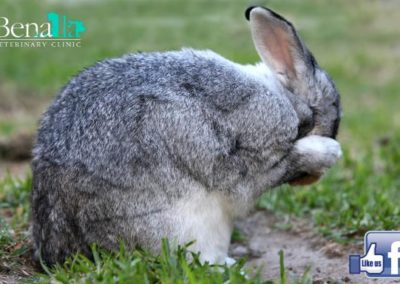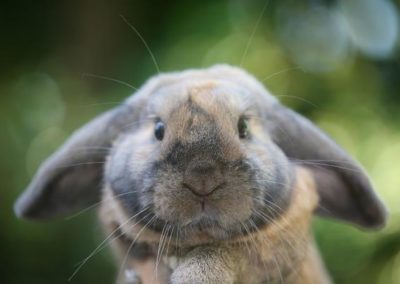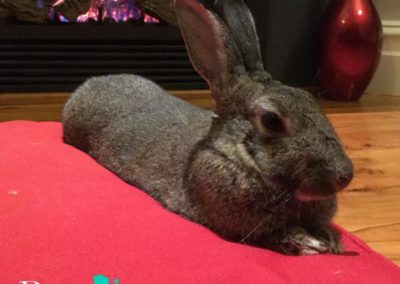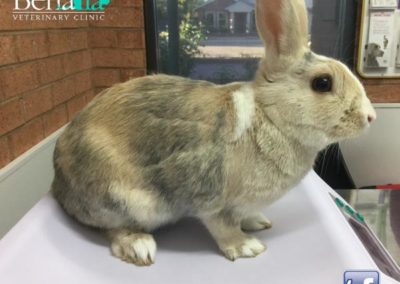Rabbit Care
at Benalla Veterinary Clinic
Rabbit Care
Rabbits are wonderful animals that have an abundance of character and charm, are extremely sociable, enjoy the company of humans and are a great way of introducing young children to responsible pet ownership. It is important to realise that rabbits are ‘prey’ animals and so are fearful of being picked up, and for this reason children should be educated that their pet will show them love and allow patting if they sit quietly and let the bunny explore them in their own time. Aim to minimise lifting up your bunny, especially when you are attempting to bond with them.
Quiet and clean, they are also easily toilet trained. They really make excellent indoor and indoor/outdoor pets as long as precautions are taken to bunny proof your house – as they love to chew objects such as electrical cables, etc.
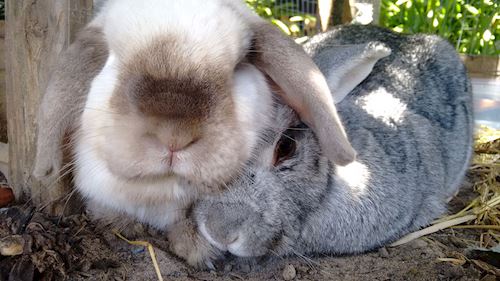
HOUSING:
While rabbits love company, they can be left alone during the day and are therefore suitable for people who work or are away from home. They are very social creatures that do enjoy the company of a partner bunny, so this is advisable if possible. A predator-proof enclosure to ensure their safety is essential. An appropriate enclosure is a hutch that is divided into two connecting compartments, one a wire mesh to allow access to natural light and fresh air, while the other is enclosed to provide protection against weather and a secure sleeping place. Th larger the better for the cage dimensions but the minimum cage dimensions should be 3m x 2m x 0.7m high, so the rabbit can stand up without its ears touching the roof.
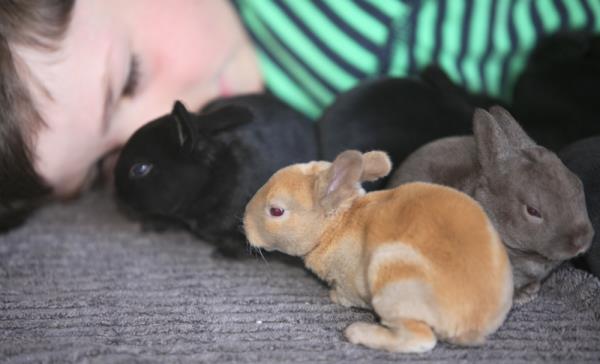
The floor of your rabbit’s hutch should be covered with newspaper and with a layer of bedding material like straw, hay or shredded paper for warmth, comfort and to prevent pressure sores on your bunny’s feet. We would recommend all rabbits be housed in mosquito proof hutches during the peak mosquito biting times of the day, ie. early afternoon and evenings. Use of mosquito netting or fly screening material will be benificial in avoiding the deadly myxomatosis disease.
Consider extreme weather conditions and ventilation when choosing a location for your hutch. Rabbits are extremely sensitive to the hot summer temperatures we experience in Australia and may quickly die of heat stroke if their hutch is not in a cool, shady position. Placing plastic water containers full of frozen water is very useful as bunnies often lay against these bottles in extreme weather.
EXERCISE and HANDLING:
Rabbits should have at least two hours outside of the hutch for exercise each day. Exercising rabbits is very important for good intestinal function as well as mental well-being. Frequently handling them will also be of benefit in keeping them tame and strengthen the human-bunny bond. Interstingly many rabbits get stressed when picked up, especially by people not accustomed to rabbit handling, and will quickly lose trust in humans. It is best therefore to minimise picking your rabbit up, but instead stroke and pat them on the ground, and let them explore you in their own time. The more time you can spend with your bunny, the more friendly.
FEEDING:
Feeding and nutrition is the most important factor in making sure your rabbit stays healthy. Many commercial rabbit foods don’t contain enough fibre (18 – 20% is required) and are too high in fats and sugars. Rabbits are herbivores so their diet should consist almost entirely of vegetable matter. Pellets and mixes should not form a main part of the diet. Grass or hay is an essential dietary component to ensure your rabbit’s health. Apart from providing a high fibre diet, chewing hay wears down their continuously-growing teeth and keeps them occupied, preventing boredom. Ideally, feed your bunny 85% hay and 15% veggies such as leafy Asian greens or endive (lettuce and too much cabbage can cause diarrhoea). Treats such as fruits, root veggies(carrots), capsicum and good quality pellets should only be offered in small amounts (eg. 1 – 2 tablespoons per day per rabbit).
Fresh water should always be available using both a drip feed bottle and an open container. Leafy greens, weeds and freshly picked grass also provide hydration for your bunny.
It is wise to provide something hard and safe for your rabbit to chew on, so that teeth are kept in check, as rabbit teeth will grow continuously throughout their lives. Sticks are very useful for wearing down rabbit teeth and also provide great entertainment.
ROUTINE HEALTH CARE:
Routine veterinary care for rabbits includes vaccination against Rabbit Haemorrahgic Disease Virus (calicivirus) and desexing (females can become quite aggressive when mature and are very prone to reproductive cancers. An incidence of 50 to 80% of unspeyed females develop uterine cancer after 3 years of age according to a study by Heatly & Smith in 2004 ). Male desexed rabbits will not only be much less aggressive, but will not tend to spray urine. Like all animals, rabbits should have regular (at least annual) veterinary checks, especially to check their teeth, backsides and claws.
Using a firm brush to remove dead hairs, tangles and pieces of garden matter should form part of your daily routine. Grass seeds can commonly become stuck in their eyes, ears and nose, causing irritation or even infection. Check your rabbit’s rear end daily to make sure it is clean and dry, if soiled it is very prone to fly strike. Regular clipping for some rabbits may be necessary to remove build up around the anus.
We welcome you to book an appointment with us to discuss how to keep your rabbit in optimal health.
RABBIT CLUB:
Please come and join our Rabbit Club – usually on the first Tuesday of the month from 6.00 pm to 7pm at the clinic from Sepember through to May. Please let us know you will be attending ahead of time, but no appointment time is allotted.
This is a great opportunity to chat to the vet and mingle with fellow bunny owners. Your bunnies will be dosed with Advantix – an off-label use of this dog medication to help prevent mosquito bites (and so reduce the risk of Myxomatosis and at the same time control rabbit fleas) and have a quick exam with the vet.
As a bonus the Calicivirus vaccination is offered with a $20 discount for Rabbit Clubbers.
Likewise we recommend microchipping your rabbit as they are very hard to identify when they are found away from home. This is discounted by $15 for Rabbit Clubbers also.
Currently our recommendation is to vaccinate every 6 months from now on until a newer more specific vaccine becomes available. A new calicivirus strain K5 was released Australia wide in March 2017

Book an Appointment with Us
We ask that you make an appointment if your animal requires veterinary attention. This ensures you will have fast and efficient service. This can now also be done online via our portal.
Proudly serving the pets of Benalla, Wangaratta, Euroa, Winton, Mansfield, Violet Town, Glenrowan, and the surrounding area.

